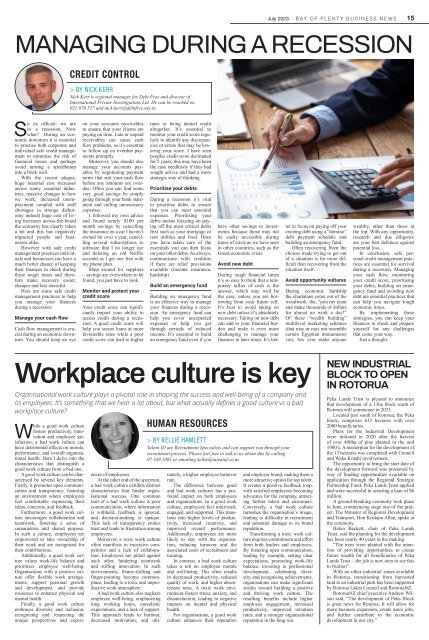July 2023 - Bay of Plenty Business News
From mid-2016 Bay of Plenty businesses have a new voice, Bay of Plenty Business News. This publication reflects the region’s growth and importance as part of the wider central North Island economy.
From mid-2016 Bay of Plenty businesses have a new voice, Bay of Plenty Business News. This publication reflects the region’s growth and importance as part of the wider central North Island economy.
You also want an ePaper? Increase the reach of your titles
YUMPU automatically turns print PDFs into web optimized ePapers that Google loves.
<strong>July</strong> <strong>2023</strong> BAY OF PLENTY BUSINESS NEWS 15<br />
MANAGING DURING A RECESSION<br />
CREDIT CONTROL<br />
> BY NICK KERR<br />
Nick Kerr is regional manager for Debt Free and director <strong>of</strong><br />
International Private Investigations Ltd. He can be reached on<br />
021 876 527 and nick.kerr@debtfree.net.nz<br />
So its <strong>of</strong>ficial: we are<br />
in a recession. Now<br />
what? During an economic<br />
downturn it is essential<br />
to practise both corporate and<br />
individual safe credit management<br />
to minimise the risk <strong>of</strong><br />
financial losses and perhaps<br />
avoid turning a speedbump<br />
into a brick wall.<br />
With the recent plague,<br />
huge material cost increases<br />
across many essential industries,<br />
massive changes to how<br />
we work, increased unemployment<br />
coupled with staff<br />
shortages (a strange dichotomy<br />
indeed) huge cost <strong>of</strong> living<br />
increases across-the-board<br />
the economy has clearly taken<br />
a hit and this has negatively<br />
impacted people and businesses<br />
alike.<br />
However with safe credit<br />
management practices individuals<br />
and businesses can have a<br />
much better chance <strong>of</strong> keeping<br />
their finances in check during<br />
these tough times and therefore<br />
make recovery easier,<br />
cheaper and less stressful.<br />
Here are some safe credit<br />
management practices to help<br />
you manage your finances<br />
during a recession:<br />
Manage your cash flow<br />
Cash flow management is crucial<br />
during an economic downturn.<br />
You should keep an eye<br />
on your accounts receivables<br />
to ensure that your clients are<br />
paying on time. Late or unpaid<br />
receivables can cause cash<br />
flow problems, so it’s essential<br />
to follow up on overdue payments<br />
promptly.<br />
Moreover, you should also<br />
manage your accounts payables<br />
by negotiating payment<br />
terms that suit your cash flow<br />
before any amounts are overdue.<br />
Often you can find some<br />
very good savings by simply<br />
going through your bank statement<br />
and culling unnecessary<br />
expenses.<br />
I followed my own advice<br />
and found nearly $100 per<br />
month savings by cancelling<br />
the insurance on a car I haven’t<br />
owned for over a year, cancelling<br />
several subscriptions to<br />
s<strong>of</strong>tware that I no longer use<br />
and deleting an old Netflix<br />
account as I get one free with<br />
my phone plan.<br />
Shop around for suppliers<br />
– savings are everywhere to be<br />
found, you just have to look.<br />
Monitor and protect your<br />
credit score<br />
Your credit score can significantly<br />
impact your ability to<br />
access credit during a recession.<br />
A good credit score will<br />
help you secure loans at more<br />
favourable rates while a poor<br />
credit score can lead to higher<br />
rates or being denied credit<br />
altogether. It’s essential to<br />
monitor your credit score regularly<br />
to identify any discrepancies<br />
or errors that may be lowering<br />
your score. I have seen<br />
peoples credit score decimated<br />
for 5 years; this may have been<br />
the case needlessly if they had<br />
sought advice and had a more<br />
strategic way <strong>of</strong> thinking.<br />
Prioritise your debts<br />
During a recession it’s vital<br />
to prioritise debts to ensure<br />
that you can meet essential<br />
expenses. Prioritising your<br />
debts means focusing on paying<br />
<strong>of</strong>f the most critical debts<br />
first such as your mortgage or<br />
rent utilities and food. Once<br />
you have taken care <strong>of</strong> the<br />
essentials you can then focus<br />
on your other debts. As always,<br />
communicate with creditors<br />
if there are relief provisions<br />
available (income insurance,<br />
hardship)<br />
Build an emergency fund<br />
Building an emergency fund<br />
is an effective way to manage<br />
your finances during a recession.<br />
An emergency fund can<br />
help you cover unexpected<br />
expenses or help you get<br />
through periods <strong>of</strong> reduced<br />
income. It’s essential to build<br />
an emergency fund even if you<br />
have other savings or investments<br />
because those may not<br />
be easily accessible during<br />
times <strong>of</strong> crisis as we have seen<br />
in other countries, such as the<br />
Greek economic crisis.<br />
Avoid new debt<br />
During tough financial times<br />
it’s so easy to think that a temporary<br />
influx <strong>of</strong> cash is the<br />
answer, which may well be<br />
the case, unless you are borrowing<br />
from your future self.<br />
It’s best to avoid taking on<br />
new debt unless it’s absolutely<br />
necessary. Taking on new debt<br />
can add to your financial burden<br />
and make it even more<br />
challenging to manage your<br />
finances in later times. It’s better<br />
to focus on paying <strong>of</strong>f your<br />
existing debt using a “domino”<br />
debt payment schedule and<br />
building an emergency fund.<br />
Often recovering from the<br />
choices made trying to get out<br />
<strong>of</strong> a situation is far more difficult<br />
than recovering from the<br />
situation itself.<br />
Avoid opportunity vultures<br />
During economic hardship<br />
the charlatans come out <strong>of</strong> the<br />
woodwork: the, “join my team<br />
and make thousands <strong>of</strong> dollars<br />
for almost no work a day!”<br />
Of these “wealth building”<br />
multilevel marketing schemes<br />
(that may or may not resemble<br />
certain Egyptian monuments)<br />
very few ever make anyone<br />
wealthy, other than those at<br />
the top. With any opportunity,<br />
research and due diligence<br />
are your best defences against<br />
potential loss.<br />
In conclusion, safe personal<br />
credit management practices<br />
are essential for survival<br />
during a recession. Managing<br />
your cash flow, monitoring<br />
your credit score, prioritising<br />
your debts, building an emergency<br />
fund and avoiding new<br />
debt are essential practices that<br />
can help you navigate tough<br />
economic times.<br />
By implementing these<br />
strategies, you can keep your<br />
finances in check and prepare<br />
yourself for any challenges<br />
that come your way.<br />
Just a thought.<br />
Workplace culture is key<br />
Organisational work culture plays a pivotal role in shaping the success and well-being <strong>of</strong> a company and<br />
its employees. It’s something that we hear a lot about, but what actually defines a good culture vs a bad<br />
workplace culture?<br />
HUMAN RESOURCES<br />
> BY KELLIE HAMLETT<br />
Talent ID are Recruitment Specialists and can support you through your<br />
recruitment process. Please feel free to talk to us about this by calling<br />
07 349 1081 or emailing kellie@talentid.co.nz<br />
While a good work culture<br />
fosters productivity, innovation<br />
and employee satisfaction,<br />
a bad work culture can<br />
have detrimental effects on morale,<br />
performance, and overall organisational<br />
health. Here I delve into the<br />
characteristics that distinguish a<br />
good work culture from a bad one.<br />
A good work culture can be characterised<br />
by several key elements.<br />
Firstly, it promotes open communication<br />
and transparency, fostering<br />
an environment where employees<br />
feel comfortable expressing their<br />
ideas, concerns, and feedback.<br />
Furthermore, a good work culture<br />
encourages collaboration and<br />
teamwork, fostering a sense <strong>of</strong><br />
camaraderie and shared purpose.<br />
In such a culture, employees are<br />
empowered to take ownership <strong>of</strong><br />
their work and are recognised for<br />
their contributions.<br />
Additionally, a good work culture<br />
values work-life balance and<br />
prioritises employee well-being.<br />
Organisations with a positive culture<br />
<strong>of</strong>fer flexible work arrangements,<br />
support personal growth<br />
and development, and provide<br />
resources to enhance physical and<br />
mental health.<br />
Finally, a good work culture<br />
embraces diversity and inclusion,<br />
recognizing and respecting the<br />
unique perspectives and experiences<br />
<strong>of</strong> employees.<br />
At the other end <strong>of</strong> the spectrum,<br />
a bad work culture exhibits distinct<br />
characteristics that hinder organisational<br />
success. One common<br />
trait <strong>of</strong> a bad work culture is poor<br />
communication, where information<br />
is withheld, feedback is ignored,<br />
and decision-making is opaque.<br />
This lack <strong>of</strong> transparency erodes<br />
trust and leads to frustration among<br />
employees.<br />
Moreover, a toxic work culture<br />
<strong>of</strong>ten manifests in excessive competition<br />
and a lack <strong>of</strong> collaboration.<br />
Employees are pitted against<br />
each other, hindering teamwork<br />
and stifling innovation. In such<br />
environments, blame-shifting and<br />
finger-pointing become commonplace,<br />
leading to a toxic and unproductive<br />
work atmosphere.<br />
A bad work culture also neglects<br />
employee well-being, emphasising<br />
long working hours, unrealistic<br />
expectations, and a lack <strong>of</strong> support.<br />
This approach leads to burnout,<br />
decreased motivation, and ultimately,<br />
a higher employee turnover<br />
rate.<br />
The difference between good<br />
and bad work cultures has a pr<strong>of</strong>ound<br />
impact on both employees<br />
and organisations. In a good work<br />
culture, employees feel motivated,<br />
engaged, and supported. This translates<br />
into higher levels <strong>of</strong> productivity,<br />
increased creativity, and<br />
improved overall performance.<br />
Additionally, employees are more<br />
likely to stay with the organisation,<br />
reducing turnover and the<br />
associated costs <strong>of</strong> recruitment and<br />
training.<br />
In contrast, a bad work culture<br />
takes a toll on employee morale<br />
and well-being. This <strong>of</strong>ten results<br />
in decreased productivity, reduced<br />
quality <strong>of</strong> work, and higher absenteeism<br />
rates. A toxic work environment<br />
fosters stress, anxiety, and<br />
dissatisfaction, leading to negative<br />
impacts on mental and physical<br />
health.<br />
For organisations, a good work<br />
culture enhances their reputation<br />
and employer brand, making them a<br />
more attractive option for top talent.<br />
It creates a positive feedback loop,<br />
with satisfied employees becoming<br />
advocates for the company, attracting<br />
further talent and customers.<br />
Conversely, a bad work culture<br />
tarnishes the organisation’s image,<br />
leading to difficulty in recruitment<br />
and potential damage to its brand<br />
reputation.<br />
Transforming a toxic work culture<br />
requires commitment and effort<br />
from both leaders and employees.<br />
By fostering open communication,<br />
leading by example, setting clear<br />
expectations, promoting work-life<br />
balance, investing in pr<strong>of</strong>essional<br />
development, celebrating diversity,<br />
and recognising achievements,<br />
organisations can make significant<br />
strides toward building a positive<br />
and thriving work culture. The<br />
resulting benefits include higher<br />
employee engagement, increased<br />
productivity, improved retention<br />
rates, and a stronger organisational<br />
reputation in the long run.<br />
NEW INDUSTRIAL<br />
BLOCK TO OPEN<br />
IN ROTORUA<br />
Peka Lands Trust is pleased to announce<br />
that development <strong>of</strong> a 13ha block south <strong>of</strong><br />
Rotorua will commence in <strong>2023</strong>.<br />
Located just south <strong>of</strong> Rotorua, the Peka<br />
block, comprises 633 hectares with over<br />
2000 beneficiaries.<br />
Plans for the Industrial Development<br />
were initiated in 2020 after the harvest<br />
<strong>of</strong> over 400ha <strong>of</strong> pine planted in the mid<br />
1980’s. A masterplan for the development <strong>of</strong><br />
the 13 hectares was completed with Council<br />
and Waka Kotahi involvement.<br />
The opportunity to bring the start date <strong>of</strong><br />
the development forward was presented by<br />
way <strong>of</strong> funding opportunities available on<br />
application through the Regional Strategic<br />
Partnership Fund, Peka Lands Trust applied<br />
and were successful in securing a loan <strong>of</strong> $6<br />
million.<br />
A ground-breaking ceremony took place<br />
in June, commencing stage one <strong>of</strong> the project.<br />
The Minister <strong>of</strong> Regional Development<br />
and Transport, Hon Kiritapu Allan, spoke at<br />
the ceremony.<br />
Helen Beckett, chair <strong>of</strong> Peka Lands<br />
Trust, said the planning for the development<br />
has been nearly 40 years in the making.<br />
“The trees were planted with the intention<br />
<strong>of</strong> providing opportunities to create<br />
future wealth for all beneficiaries <strong>of</strong> Peka<br />
Lands Trust – the job is now ours to see this<br />
to fruition”.<br />
With no other industrial zones available<br />
in Rotorua, transitioning from harvested<br />
land to an industrial park has been supported<br />
by Rotorua Lakes Council and RotoruaNZ.<br />
RotoruaNZ chief executive Andrew Wilson<br />
said, “The development <strong>of</strong> Peka Block<br />
is great news for Rotorua. It will allow for<br />
more business expansion, create more jobs,<br />
and further contribute to the economic<br />
development in our city.”
















